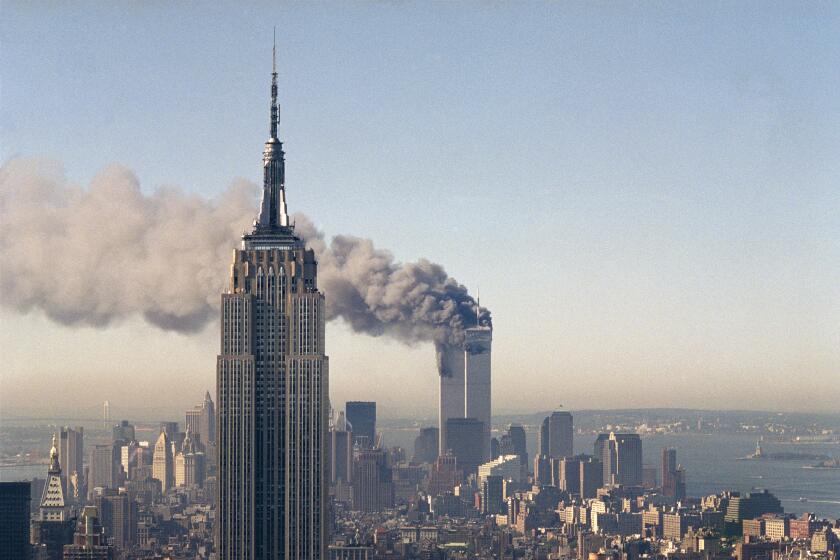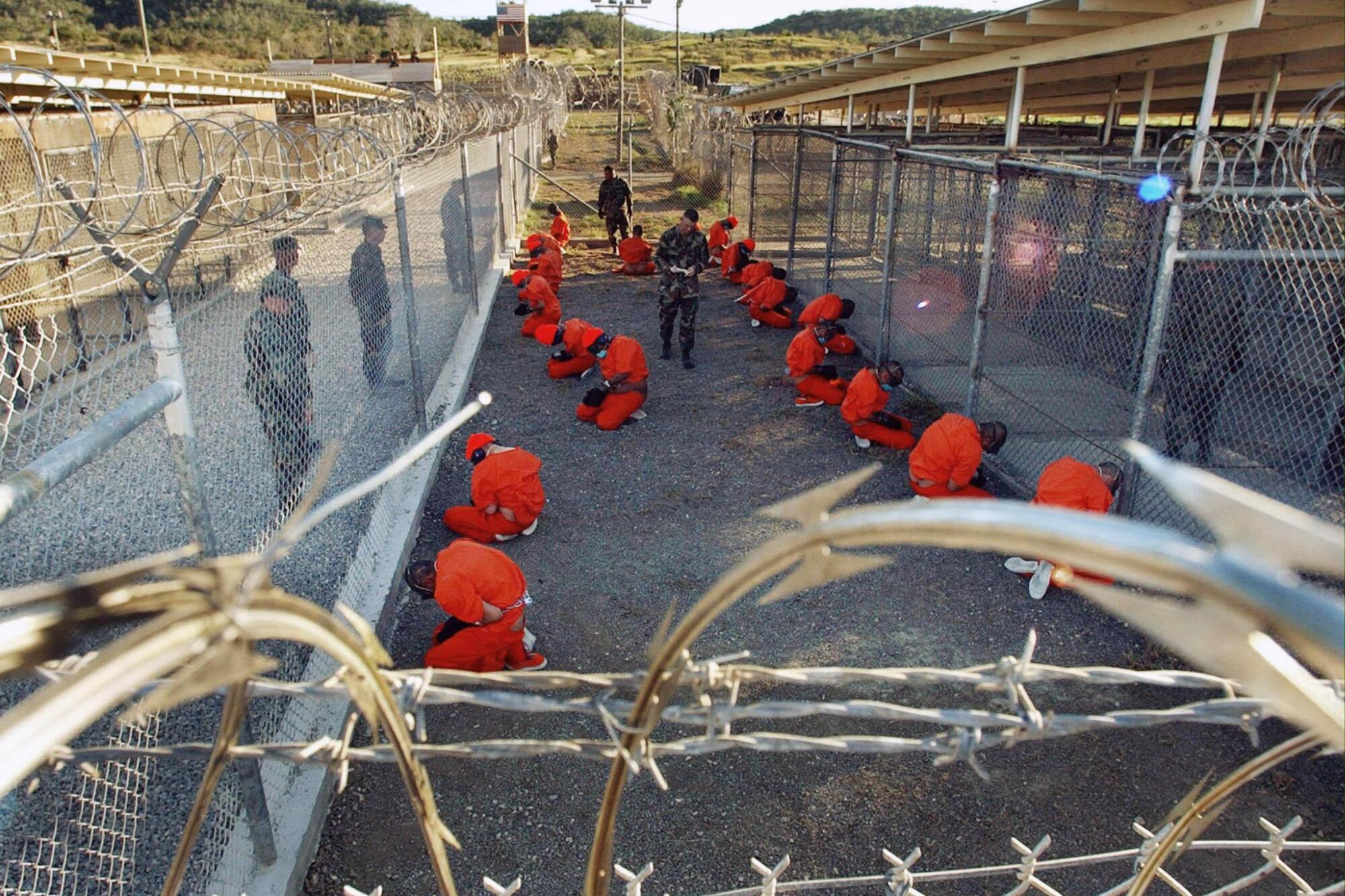
- Share via
GUANTANAMO BAY NAVAL BASE, Cuba — On a bright California morning 20 years ago, I was driving my middle daughter to meet her high school carpool when I heard a report on the radio that an airplane had crashed into the north tower of New York’s World Trade Center. Minutes later another plane hit the south tower. I dropped off my daughter, went home and packed a bag.
I had no idea what was going on, but I knew at least that it wasn’t good and that I might be asked to go somewhere and help find out. The somewhere ended up being more than two dozen countries on four continents. I’m still out here on the road trying to understand the why.
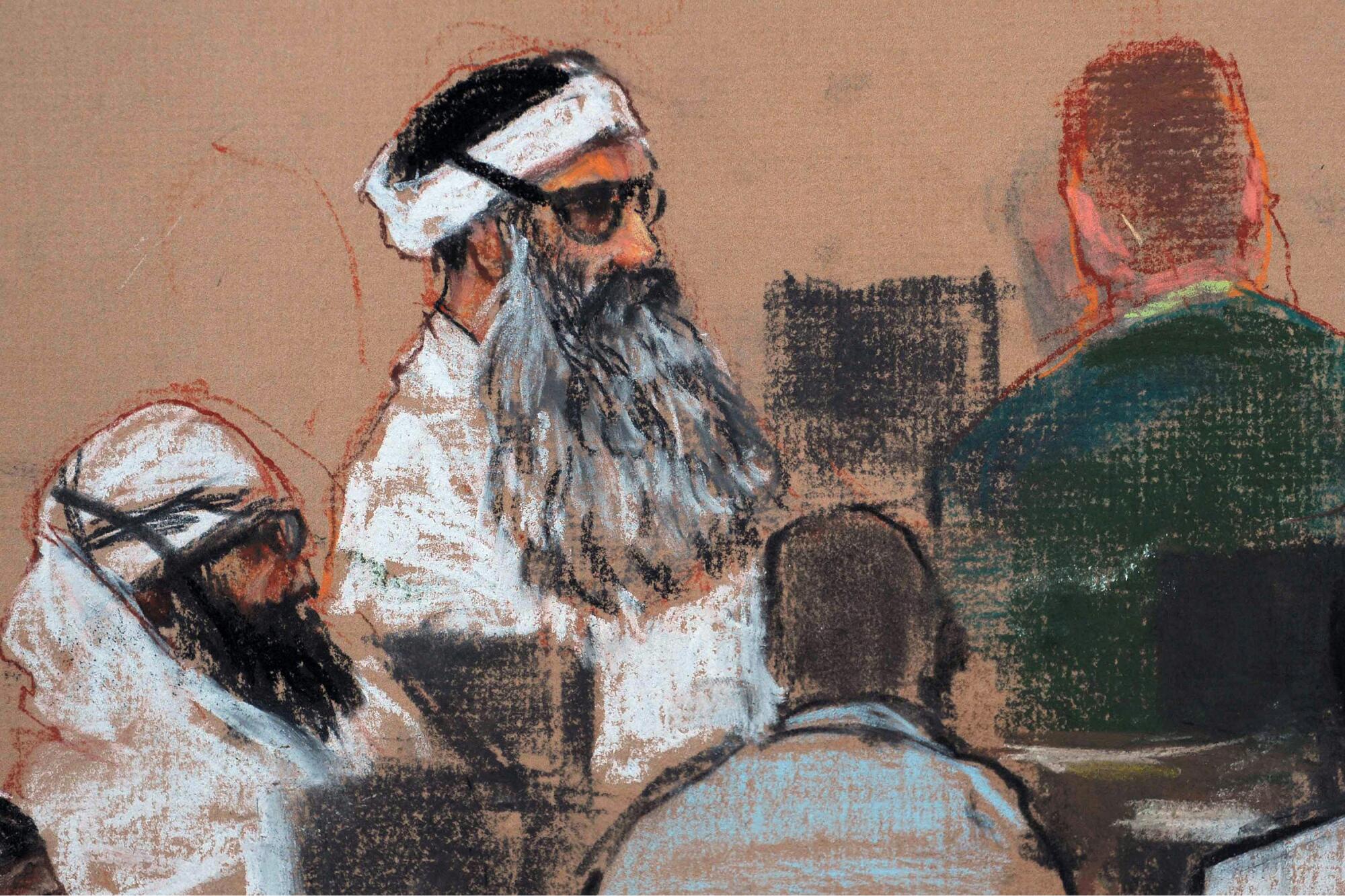
Pretrial hearings for the man accused of planning and managing the Sept. 11 terrorist attacks and several alleged accomplices resumed here at the Guantanamo Bay Naval Base this week after a year-plus pandemic pause. Khalid Shaikh Mohammed and four other men are charged in the deaths of nearly 3,000 people. The new round of hearings are proceeding in much the same fashion as the 41 previous ones over the last decade, which is to say they are fractious, ponderous and without an end in sight. There is no date for the trial to start.
In some ways, the hearings are an inexplicable slog through alien terrain, but in at least one important regard they are a nearly perfect example of life in our post-9/11 world.
By that, I mean the difficulties of the trial stem directly from the U.S. reaction to the attacks.
::
Within a week of 9/11, The Times sent me to Egypt to piece together what fragments I could find of the life of Mohamed Atta, the man who piloted American Airlines Flight 11 into the north tower, killing himself and more than 1,000 others in the process.
The world press had stormed through Cairo, Atta’s hometown, and Hamburg, Germany, where he went to graduate school, leaving behind a depiction of Atta as a mysterious terrorist mastermind. He was portrayed as an angry architect who hated modern skyscrapers as symbols of Western decadence and thus sought to destroy them. He and his fellow hijackers were described as evil geniuses or wild-eyed fanatics.
That’s the notion I started with as well, but the facts on the ground didn’t fit. I should say first that those facts were few and well-hidden. I was growing more despondent by the day at my inability to uncover them. Friends and family were uncooperative. Few people in Cairo even believed that Atta had been on Flight 11.
I had hired a young, upper-class Egyptian, a man I’ll call Ali, as an interpreter. Ali was finishing his studies to become an ophthalmologist. His fiancee was going to journalism school in the U.S., and Ali wanted to know what she was getting into, so he eagerly accepted my offer. As was typical with many wealthier people in town, Ali was very Westernized. He intended to eventually move to New York. He smoked, drank and generally behaved like the typical dissolute reporter.
One evening, weeks after I had arrived, we were drinking beer at a shaded poolside patio. The day, like many others, had been unproductive. As we sat and tried to figure out what to do next, Ali said: Terry, tell me why the Jews didn’t go to work that day.
I stared in disbelief.
What? What did you say?
The Jews stayed home on 9/11, he said.
Are you nuts, Ali? Hundreds of Jews died, I said.
I don’t think so. The Mossad told them to skip work, he said, referring to Israel’s intelligence agency.
This was a widespread belief. Cairo then had a vigorous press, with more than a dozen daily newspapers. It was a rare day when one of them didn’t have a story blaming Israel for 9/11. But Ali was a doctor, a man of science. Surely he knew better. No, in fact, he did not. He thought his people, the Arabs, who had built one of the greatest civilizations, were incapable of executing such an attack against the all-powerful American empire.
Twenty years after terrorists crashed hijacked planes into New York’s World Trade Center, the Pentagon and a field in Pennsylvania, the U.S. is still reckoning with the attack that toppled the twin towers, killed nearly 3,000 people, triggered a wave of increased security and launched a war on terrorism.
This made no sense to me until another day, when I asked Ali why the bridge we were driving on to cross the Nile was named the 6th of October Bridge. It’s for the war, he told me. The October war against Israel.
You mean the 1973 Yom Kippur War? You named a bridge after a war you lost?
We won, Ali said, by which he meant the Arab armies had won great victories in the first days of their surprise attacks in the Sinai Peninsula and the Golan Heights. The war ended with the Egyptian army surrounded in the desert, not the sort of thing a country ordinarily celebrates.
No political movement has surpassed the speed and breadth of the spread of Islam from its 7th century desert origins. In little more than 100 years, the prophet Muhammad’s word and army had reached westward across the rim of Africa, south to the equatorial center of the continent and as far north as the Pyrenees and east from the Bosporus through the heart of Asia, blanketing much in between.
Its decline has been equally broad, deep and long-lasting. It has left an entire culture in a crisis of confidence, feeding a despair that became the ground that gave rise to 9/11. It was ground soaked in myth. As I now know, Arabs are not alone in this. We all seem to be wading through mythic swamps of one kind or another.
::
I eventually made inroads among Atta’s friends and family and began to construct a notion of who he had been. He was spoiled, driven to his university classes every day by his father, and, as the youngest of three children and the only boy, coddled by his mother.
He received an undergraduate degree in architecture from Cairo University. He excelled at technical subjects and struggled with more creative work. In Cairo, Atta in many ways was an utterly ordinary young man, a good but not exceptional student, with plenty of male and female friends. If he had strong political views, he didn’t broadcast them.
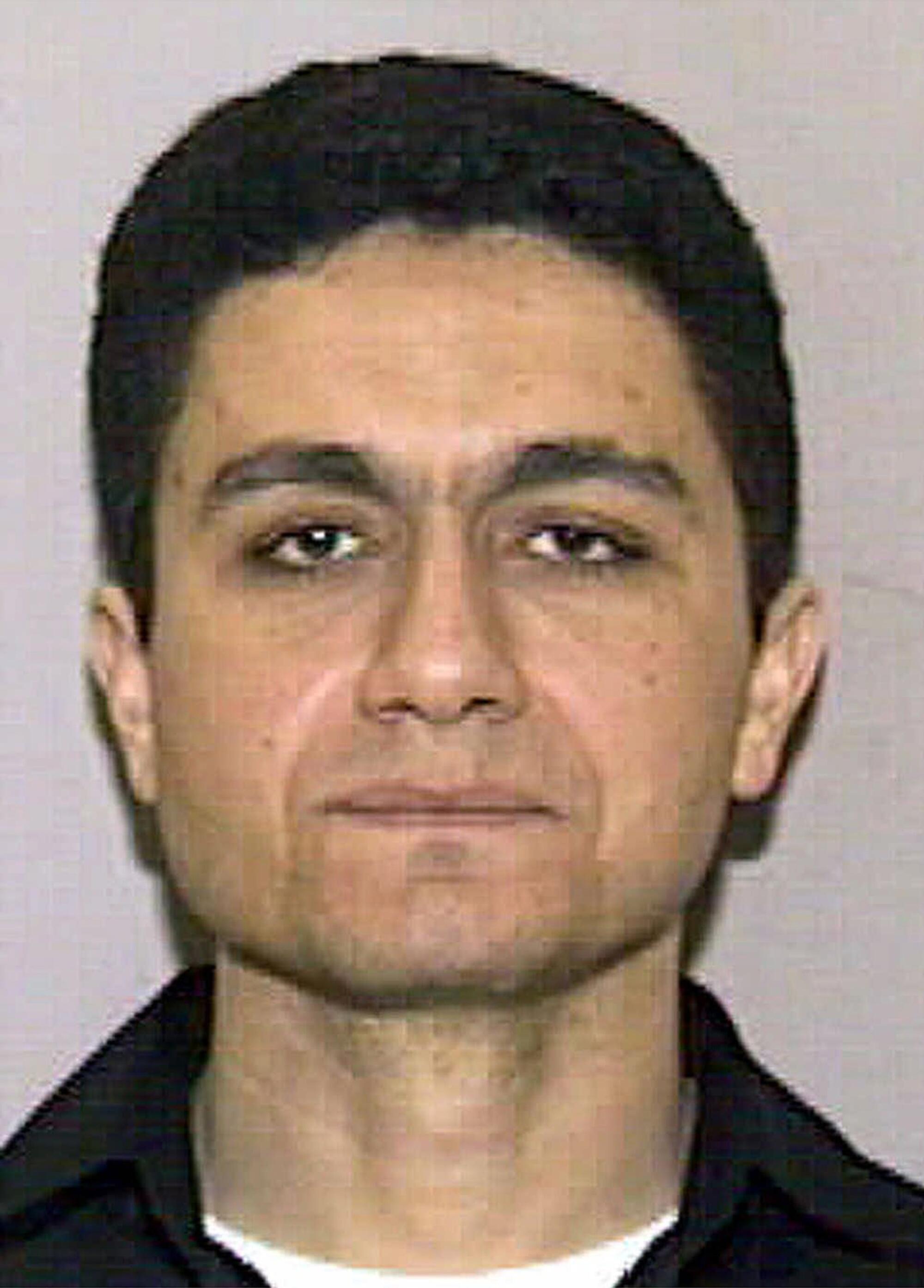
Atta’s father was a careful man, a lawyer who had spent his entire career trying to steer clear of Egypt’s volatile politics, which meant steering clear of religion as well. The family never went to the mosque, which made it all that much stranger when Atta moved to Germany for graduate school and on the first day asked his host family for the location of the nearest mosque.
A lot about Atta would change. He began praying five times a day and observing a strict Islamic diet. He seldom socialized, never went to clubs or sporting events and had little tolerance for any display of female sexuality. Even sleeveless blouses caused him to grimace.
He took a part-time job at an urban planning firm. His boss called Atta an exceptional draftsman — a “drawing slave,” he said — much more adept at copying plans than creating them.
I eventually found two of his student apartment roommates, two very different individuals who each came to view Atta as a dark, sullen presence.
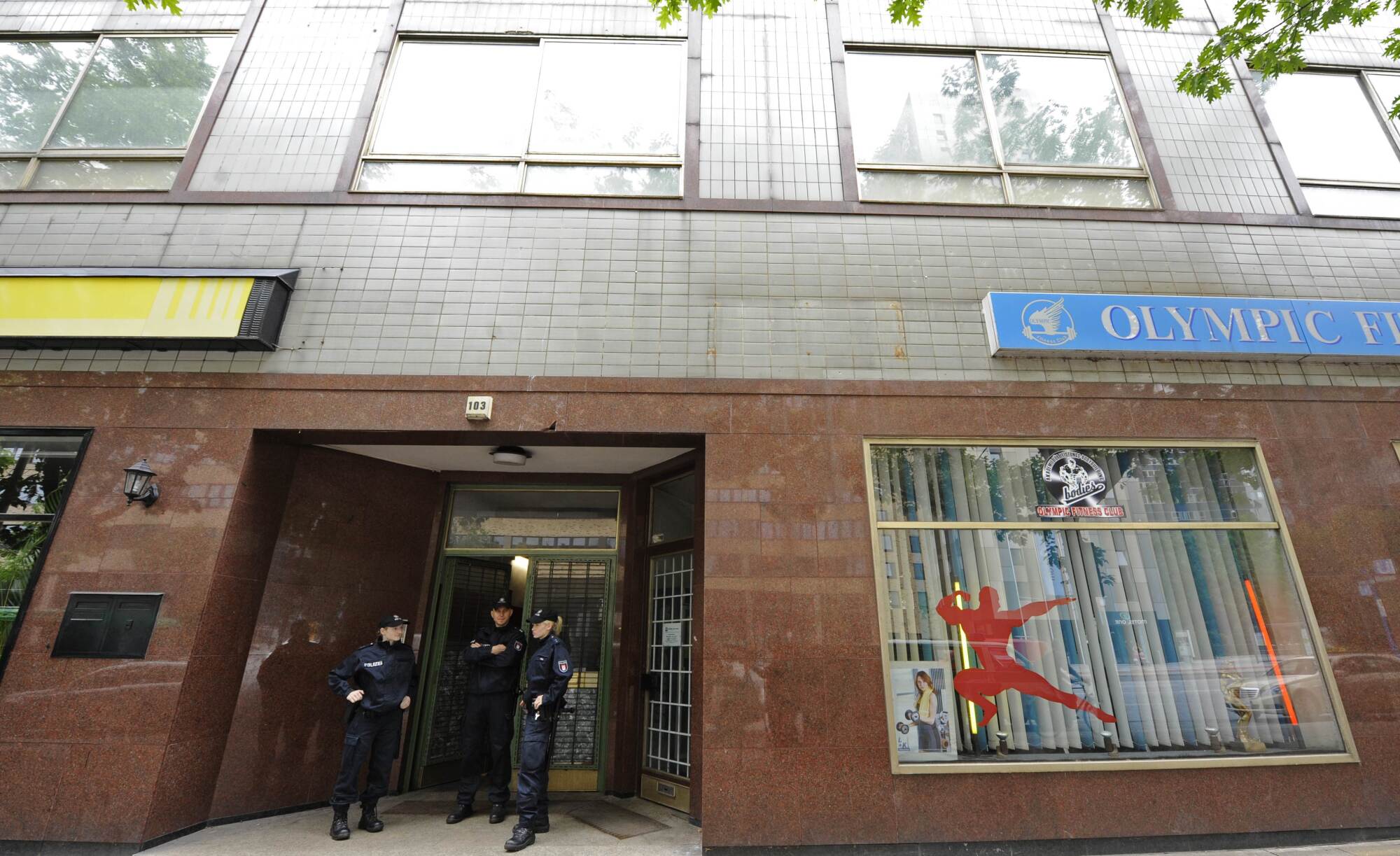
Atta’s life revolved around Al Quds Mosque, one of the few Arab mosques in Hamburg and one of the most radical in Europe. He became part of a group of young men, mostly students, who plunged deeper and deeper into their religion. They discussed for hours at a time their duties as pious Muslims.
They eventually decided they should become soldiers for Islam and go to Chechnya to fight the Russians. This first meant a trip to Afghanistan to receive training. They arrived just after Osama bin Laden approved the plan allegedly hatched by Khalid Shaikh Mohammed to attack the United States using aircraft as missiles.
One of Atta’s roommates in Hamburg had a girlfriend who was a frequent visitor to their apartment. She remarked that later in the fall of 2001, after U.S.-led forces invaded Afghanistan, she would stare dumbfounded at scenes from the war on TV. She said she couldn’t process the degree to which so much of what she saw was initiated by Atta, the man she remembered as little Mohamed padding about the apartment in blue shower shoes.
The more I learned about Atta, apart from his gloomy disposition, the more he seemed an utterly ordinary man. This story repeated itself over the next several years as I tracked the trails of other hijackers and their Al Qaeda superiors. Their lives up until 9/11 had been mundane.
Two of the hijackers lived for a time in San Diego. They struck friends as inconsequential tourists who were somewhat lazy. They had for a time taken English language classes and some flight instruction. They quit both within weeks because the studies were too difficult.
One bought a season pass to SeaWorld. The other took a break from his mission to fly home to Yemen to see his baby daughter. They were careless. They repeatedly made international cellphone calls to an Al Qaeda contact, calls that were monitored by the National Security Agency. They were more like Peter Pan’s lost boys than hardened criminals.
It wasn’t cleverness or resourcefulness that stopped them from getting caught. It was that the NSA largely ignored the information its satellites scooped up. They rented a room from an FBI informant, who neglected to tell his handlers about the two unemployed, non-English speaking Saudis who spent months in California with no visible means of support.
As I broadened my research I spent considerable time trying to determine who recruited the 19 hijackers. After months of fruitless research, I was forced to conclude that no one had recruited them. They had simply shown up; they were volunteers.
This seemed at odds with the Al Qaeda described by many terrorism experts. Their Al Qaeda was a slick, sprawling network with thousands of highly trained operatives scattered across the globe. The one I saw was a ragtag outfit high on rhetoric and ambition, but short on expertise.
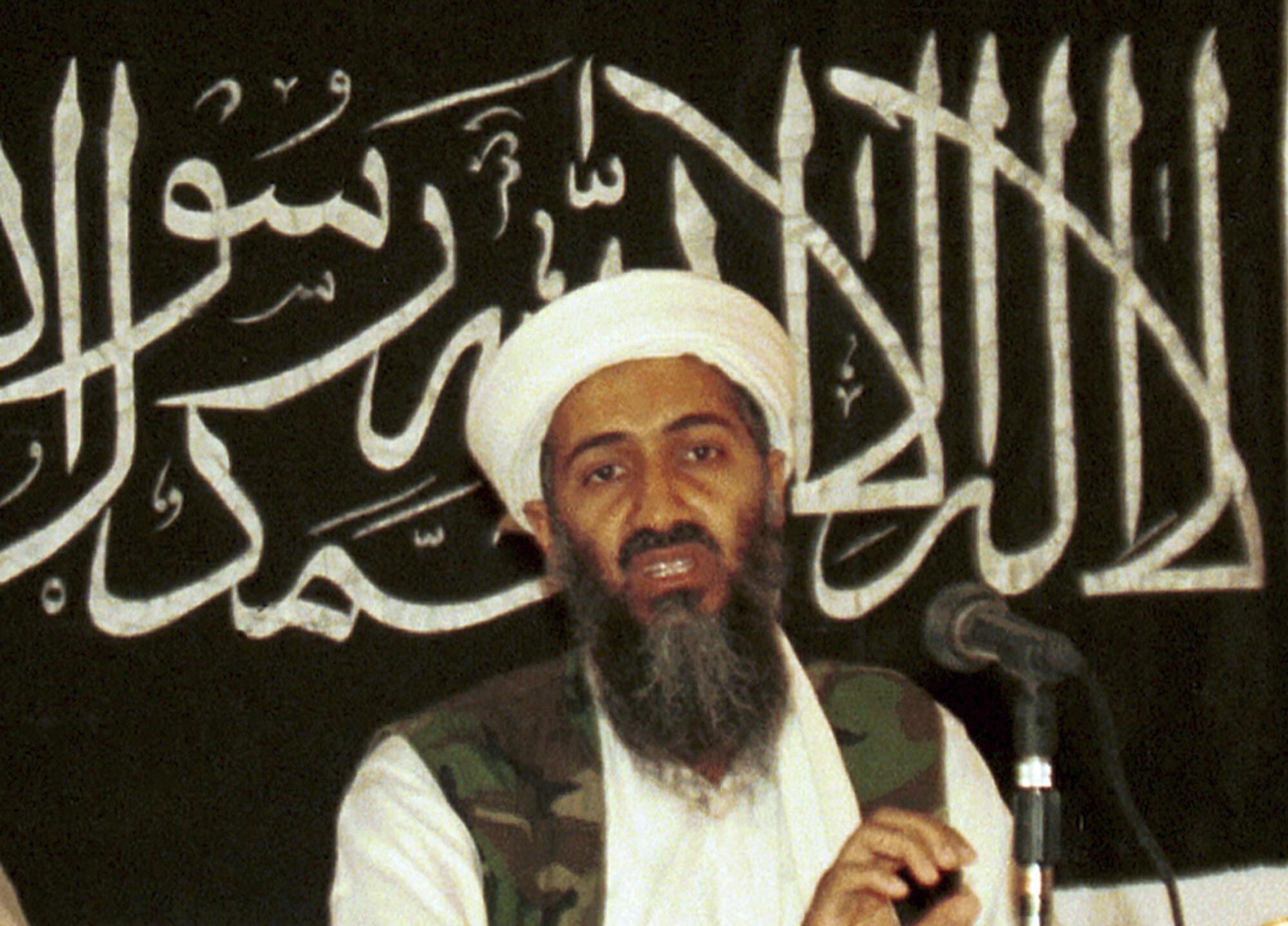
The 9/11 attacks came as such a shock largely because of our ignorance and our almost comic sense of our own innocence. Because the attacks seemed so impossibly effective we imagined the attackers as an army of immense skill and wherewithal.
U.S. government estimates of Al Qaeda’s size and reach were off by orders of magnitude. Our counter-terrorism strategies had been focused on state actors. Even after realizing we had been attacked not by a nation, but by a terrorist group, we blew them up to the size of a state with the capabilities of a state.
I remember being astonished in my reporting that nearly everybody who had even a passing connection to Al Qaeda seemed to have met Bin Laden for tea. One man who studies these issues describes Al Qaeda not as a fearsome army but as a bunch of guys.
The misestimation is important because it led us on a path of overreaction. We overestimated our own abilities as well — we would destroy Al Qaeda, capture or kill Bin Laden, rebuild Afghanistan and later Iraq in our image. We succeeded only at killing Bin Laden. The results of our other failures are on display today in Afghanistan.
::
The courtroom here at the Guantanamo naval base is where the costs of our overreactions have come due.
The attempts to try Khalid Shaikh Mohammed and his four codefendants stretch back to 2008, when they were initially indicted. Hundreds of lawyers have been engaged over the years. Depending on how you count, between four and nine judges have been assigned to the proceedings. The last of those is overseeing pretrial hearings for his first time this week.
There are several reasons that the attempt to bring justice has taken so long, starting with the complexity of the case, the largest capital murder trial in U.S. history. By one estimate, at least 500,000 documents have been produced over the years. The new judge is going to be a busy man.
Then there is the location. The trial is being held at Guantanamo because the George W. Bush administration determined it would be difficult to try the accused in civilian courts as a result of the torture they were subjected to at CIA “black sites,” or secret prisons overseas.
The administration established a new organization to run the trials — the Office of Military Commissions, which created a court system whose rules are a hybrid of military courts-martial and federal civilian courts.
During his campaign for president, Barack Obama had pledged to close the prison at Guantanamo and bring the trial to New York. When Congress prevented that from happening, Obama relented and reestablished the Military Commissions office.
Guantanamo is a three-hour flight from Washington, where the Military Commissions office is headquartered. Everyone involved in the trials flies down on military charter flights together — the judge, the prosecutors, the defense attorneys, staff, journalists, NGO representatives and relatives of 9/11 victims.
Trial operations ordinarily take place for a week or two every other month, making any notion of a speedy trial far-fetched.
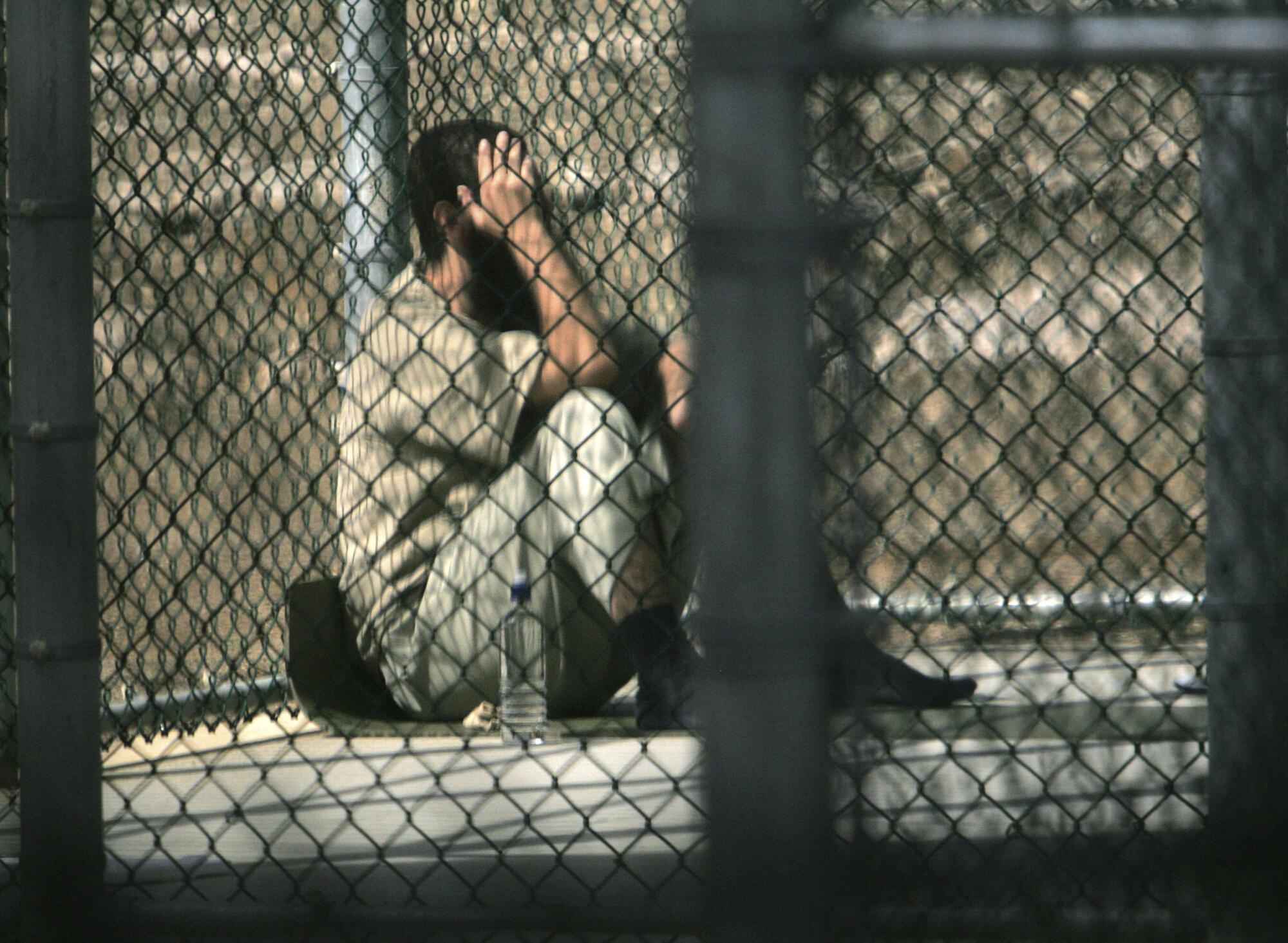
The hearings are held in a small section of the Navy base called Camp Justice, which was intended to be temporary. It feels like it. There is no potable water. The generators that provide the electricity make enough noise that you wonder if you haven’t accidentally walked onto an airport runway. Latrines leak, computers fry. Black mold is everywhere. An adjacent aircraft hangar is closed off because its roof is collapsing.
The single greatest reason for the length of the trial is debate over how the history of torture should be handled from a legal standpoint.
The prosecution long tried to deny it happened and forbids its discussion in the court. But that strategy collapsed last year when the men who devised the “enhanced interrogation program” testified in sometimes excruciating detail about it. Nonetheless, no definitive ruling has been made on the degree to which torture influenced confessions made by the defendants. Defense attorneys want those confessions barred from trial.
The CIA defense of its interrogation techniques has consistently been that its employees did what they did because the country was under existential threat. They were tasked with stopping the next attack and did whatever they felt was necessary to do it.
The notion that the country’s very existence was threatened by Al Qaeda is tenuous at best, but typical of the time and at the root of the problems we have had since.
I’ve spent about half the last 20 years researching 9/11 and its fallout. As journalists, we made mistakes similar to those made by our nation’s leaders. We overreacted. Fundamental changes to life in America proved to be not so fundamental at all. A united nation pretty quickly disunited thereafter. And there we remain.
More to Read
Sign up for Essential California
The most important California stories and recommendations in your inbox every morning.
You may occasionally receive promotional content from the Los Angeles Times.
